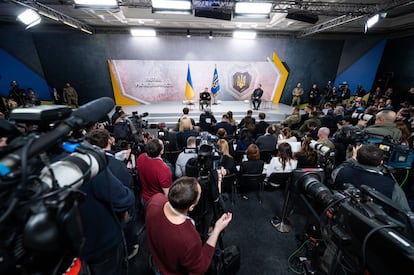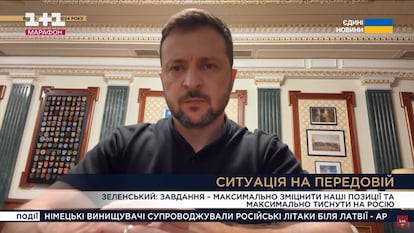Ukraine loses confidence in Zelenskiy’s newscast
Polls, international organizations and Ukrainian journalists are all criticizing ‘United News,’ the merger of various Ukrainian television channels to broadcast 24-hour news controlled by the government

To understand what the so-called telethon in Ukraine, branded as Yedyni Novyny or United News, it’s best to imagine a 24-hour news program — one that’s supervised by the government.
This has been happening in Ukraine since February 2022, when the Russian invasion began. The Ukrainian presidency announced — due to the exceptional nature of the situation — the creation of a unified news program that covers most of the daily events and is broadcast by both public and privately-owned channels. Media groups that rejected the order to participate in this lost the option of having a broadcasting license and being able to operate on cable or internet platforms. However, two-and-a-half years later, citizens are turning their backs on United News, considering it to be a propaganda tool.
The principal Ukrainian polling groups that regularly ask the population about the program have found that, with each passing month, the credibility of the project is diminishing. On September 9, the latest survey by the Razumkov Center on this issue was published: 51% of respondents felt that the telethon is no longer relevant as a source of information, compared to 17% who think it is. The rest of those polled responded “don’t know,” or refused to select an option.
Andriana Kucher is an anchor for Channel 24, a television channel that’s not part of the telethon. Channel 24′s news programs are broadcast online: it’s the audiovisual medium with the most followers on YouTube in Ukraine (7.6 million subscribers). Channels that aren’t included in the telethon’s programming aren’t permitted to broadcast on digital terrestrial television. The most notorious cases were that of Channel 5 — owned by former president and businessman Petro Poroshenko — and Espreso TV. Both media outlets are critical of the head of state, Volodymyr Zelenskiy.
“The telethon made sense in the early stages of the war, because the situation was chaotic and it provided security. But, just three months later, it became something negative, propaganda,” Kucher notes. “It has no in-depth reporting, nor diversity of opinions, which is why I hardly watch it.”
“The key problem with United News is that it’s lost credibility, because it’s become propaganda that avoids reporting on the government’s mistakes,” says Petro Burkovskyi, director of the Ilko Kucheriv Democratic Initiatives Foundation. ”In and of itself, it’s neither good nor bad… it’s just another tool during [a time of] war. But the public considers it to be an instrument in the wrong hands, often put to negative use.”
Burkovskyi — like Kucher — stresses that the TV program was a useful tool at the beginning of the invasion to counter Russian disinformation that wanted to destabilize the Ukrainian population, by convincing them that the army wasn’t fighting and that the government had fled. Based on data from another survey from 2024, Burkovskyi notes that currently only 36% of Ukrainians use United News as their main source of information. To reverse the situation, the head of the Democratic Initiatives Foundation believes that it’s time for control of its programming to be transferred to professionals from Suspilne, the state-owned television and radio corporation.

The editorial staff of the news networks participating in United News are each responsible for different broadcast slots. The plurality of opinions is slightly greater when the news is produced by public television. This was confirmed by a study published this past April by the Center for Media Plurality and Freedom, an agency of the Robert Schuman Center of the EU. The author of the document — Dariia Opryschko — pointed out that while public media outlets are obliged to give voice to opposition parties, on private channels, no critical voices are invited. Opryschko emphasizes that journalistic standards are frequently violated in United News.
The content is decided in meetings between representatives of the networks. However, there is direct intervention and supervision by the president’s office. This has been revealed by several examples put together by journalist Simon Shuster in The Showman (2024), one of the most notable books published to-date on Zelenskiy’s management of the war. Shuster was able to live with the president and his team during the first year of the invasion. “Nothing of the sort had existed in Ukraine since the Soviet era, and critics complained that it smacked of wartime propaganda,” the author writes.
Criticism from Brussels and Washington
The European Commission — in a document from November 2023 — warned that, on Ukraine’s path to EU membership, it is essential to address the lack of plurality on television: “Ukraine needs to envisage new ways to ensure a post-war structure for pluralistic and independent non-online media (in particular television), including the long-term outlook of the public broadcaster and independence of the national regulator.”
More severe was the report by the U.S. State Department on the human rights situation in Ukraine, published in April 2023: “President ZelenskIy signed a decree imposing martial law in February 2022 following Russia’s full-scale invasion of Ukraine, which permitted further restrictions on the media and media freedoms. For example, the national TV Marathon [United News] — a rotating platform of channels that take the government line on war reporting — enabled an unprecedented level of control over primetime television news.”
The U.S. government analysis includes a recurring warning from human rights and journalistic institutions in Ukraine: “The government banned, blocked, or sanctioned media outlets and individual journalists deemed a threat to national security or who expressed positions authorities believed undermined the country’s sovereignty and territorial integrity.”
Opryshko stresses that media pluralism in Ukraine has declined, but the situation is better for traditional newspapers, online media platforms and radio stations. The problem, she says, is in television. Three channels lost their broadcasting licenses “without ground,” just for being against the unified newscast. This expert says that the telethon is one of the reasons why “people massively move to social media platforms in search of news,” especially to anonymous news channels on Telegram. The Ukrainian authorities have been warning for a year about the dangers posed by the use of this application among soldiers (it’s the most common communication system between troops), but also about the access that Ukrainian citizens have to pro-Russian information channels.
The president’s office has insisted that United News is indeed a reliable source of news in the face of Russian disinformation. This is what newly-appointed Minister of Culture Mykola Tochytksyi has also argued. On September 6, in the Verkhovna Rada — the Ukrainian parliament — the minister said that it was essential to maintain the broadcast, “because it’s important that there’s a single voice that tells [the Ukrainian population] what’s happening.” The minister did concede that it’s necessary to reform the program, so as to “find a way to make it interesting for the public.”
Sign up for our weekly newsletter to get more English-language news coverage from EL PAÍS USA Edition
Tu suscripción se está usando en otro dispositivo
¿Quieres añadir otro usuario a tu suscripción?
Si continúas leyendo en este dispositivo, no se podrá leer en el otro.
FlechaTu suscripción se está usando en otro dispositivo y solo puedes acceder a EL PAÍS desde un dispositivo a la vez.
Si quieres compartir tu cuenta, cambia tu suscripción a la modalidad Premium, así podrás añadir otro usuario. Cada uno accederá con su propia cuenta de email, lo que os permitirá personalizar vuestra experiencia en EL PAÍS.
¿Tienes una suscripción de empresa? Accede aquí para contratar más cuentas.
En el caso de no saber quién está usando tu cuenta, te recomendamos cambiar tu contraseña aquí.
Si decides continuar compartiendo tu cuenta, este mensaje se mostrará en tu dispositivo y en el de la otra persona que está usando tu cuenta de forma indefinida, afectando a tu experiencia de lectura. Puedes consultar aquí los términos y condiciones de la suscripción digital.









































